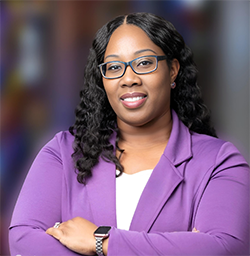
Dr Scales is a native of Shreveport, LA, and has been voted “Educator of the Year” twice in her academic tenure. She is a lifetime enthusiast of teaching and learning, specifically in the areas of STEAM. Her academic experience spans nearly 18 years from secondary to post-secondary education. She currently serves as the Vice President for Academic Affairs and Strategic Retention at Wiley University.
1. What’s your earliest memory of doing mathematics?
My earliest memory of doing mathematics dates to around age 5 while teaching a younger sibling to count. Even at a young age, I enjoyed teaching and learning. I remember lining Cheerios along the edge of the dining room table and pointing to each one as I helped my little sister count and eventually “skip count” by twos.
2. How has mathematics education changed in the time you have been involved in it?
There have been several shifts in mathematics education over my life. One shift is the elimination of routine memorisation and towards a focus on problem-solving, critical thinking and conceptual understanding. While some students can explain the “why” of basic math principles, I’ve noticed a slight struggle with basic mathematical operations such as multiplication and division. Modern mathematics education now emphasises the application of mathematical concepts to real-world situations. I’ve enjoyed the integration of technology in mathematics classrooms beyond calculators.
3. Tell me about a time in your career when something totally flabbergasted you.
One instance that comes to mind occurred while teaching high school physics, when I encountered a user who had an incredibly deep and nuanced understanding of a niche topic. Despite my extensive training on a wide range of subjects, this user was able to provide insights, perspectives and details that I hadn't encountered before. It was surprising to witness the depth of knowledge and expertise that some individuals possess in specialised areas.
4. Do you practise mathematics differently in company?
In higher education settings, my practice regarding mathematics is tailored to meet the needs of students, educators and researchers. This involves calculating student success outcomes such as retention and graduation rates. I frequently calculate enrolment trends as well as projections.
5. Do you think a brilliant maths teacher is born or made?
The question of whether a brilliant math teacher is born or made is complex and involves a combination of innate abilities, personal characteristics and professional development. Some individuals may naturally possess certain qualities that contribute to their effectiveness as math teachers; these could include strong mathematical aptitude, problem-solving skills, communication abilities, patience and enthusiasm for teaching. Other people may seem to have a natural knack for teaching mathematics. However, it is important to note that natural abilities alone do not guarantee success as a teacher.
6. What’s the most fun a mathematician can have?
I love the subjectivity of this question, especially since my students think I “do math” all day. I enjoy life to the fullest, and yes, I also have passions within the field of mathematics. Finding symmetry in everyday structures is fascinating to me. So, it’s a topic I seek when travelling with my family or on girls’ trips. Doing calculations in my head is always a personal challenge of mine. My friends have learned to challenge me as well. All in all, I find joy in spending time with my family and friends – no math involved.
7. Do you have a favourite maths joke?
Although they are often corny, my favorite math jokes are:
Why was the math book sad?
Because it had too many problems!
Why was the equal sign so humble?
Because it knew it wasn't less than or greater than anyone else.
Yes, I also have t-shirts with these jokes printed on the front.
Join the conversation: You can tweet us @CambridgeMaths or comment below.